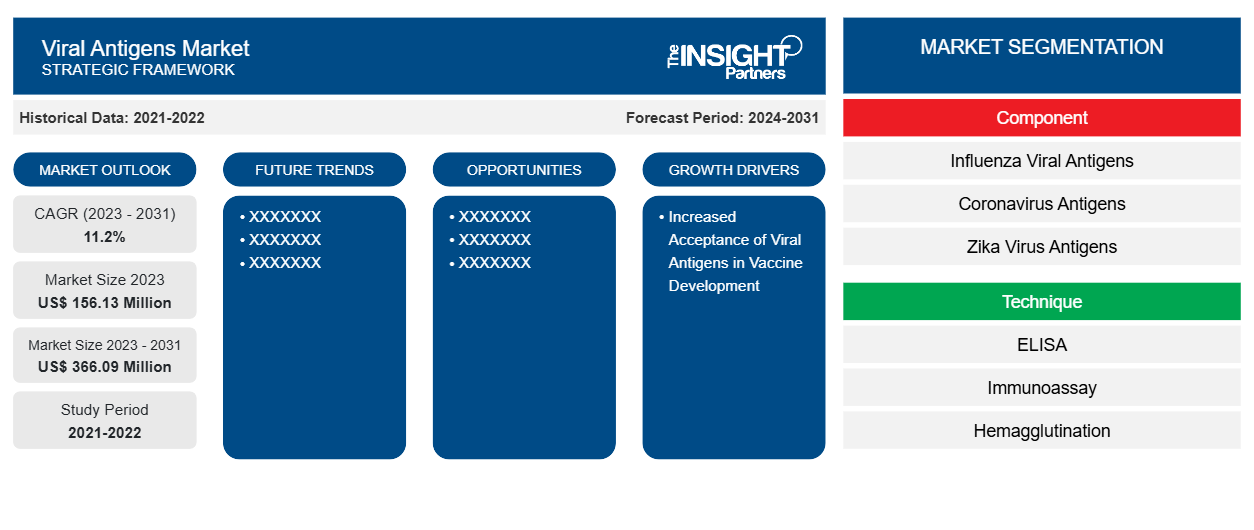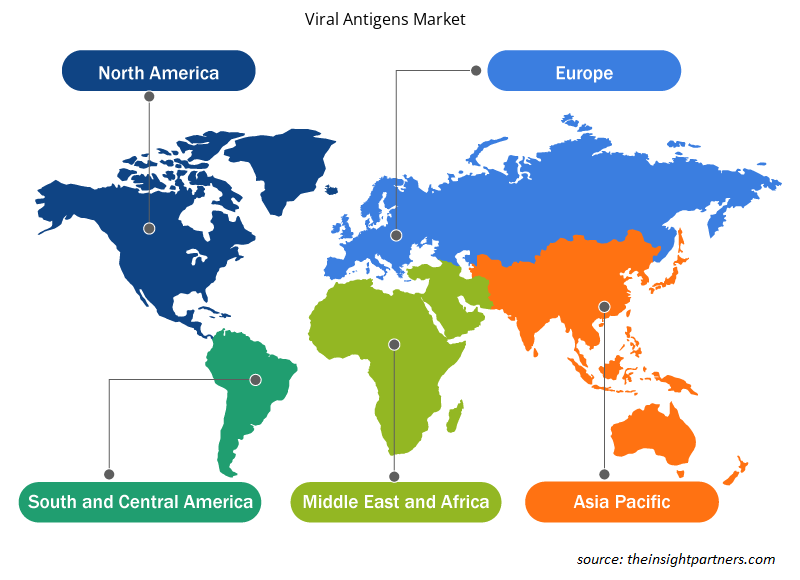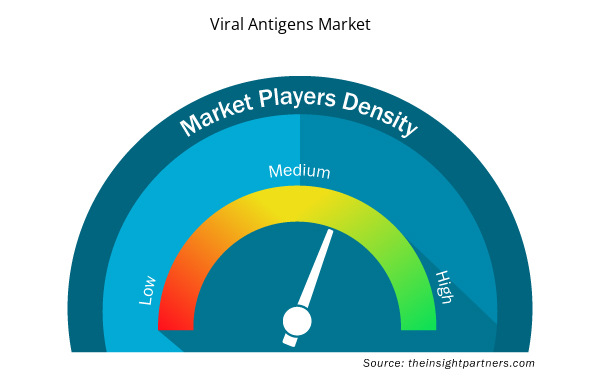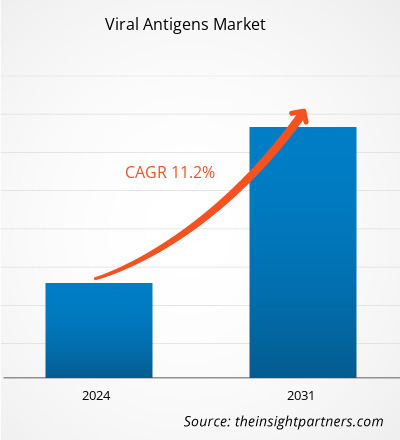The Viral Antigens Market size was estimated to be US$ 156.13 million in 2023 and is expected to reach US$ 366.09 million by 2031; it is estimated to record a CAGR of 11.2% till 2031. Development of plant-made vaccine antigens and biopharmaceuticals are likely to remain key Viral Antigens Market trends.
Viral Antigens Market Analysis
The rising prevalence of viral infections worldwide, including, HIV, influenza, hepatitis, and respiratory viruses like COVID-19, drives the demand for viral antigens which are used in diagnostic studies. Advancements in molecular biology, government initiatives for vaccine development against emerging viruses, increasing R&D activities for diagnostic technique development and vaccine development, and increasing investment in viral antigen research is fueling the growth of the viral antigen market.
Viral Antigens Market Overview
A virus can infect all types of life forms, from plants and animals to archaea and bacteria. A virus antigen is a poison or toxic substance administered by a virus that induces an immune reaction in its host. A viral protein is an antigen identified by the viral genome that can be recognized through a particular immunological response. A viral antigen is determined by IFA in neutrophils and platelets from bone marrow or blood or in serum, saliva, tears, or plasma by ELISA. Nucleic amplification tests can also be used to determine the stage of infection. The best outcomes are obtained when antigens are measured through blood tests or serum.
Customize This Report To Suit Your Requirement
You will get customization on any report - free of charge - including parts of this report, or country-level analysis, Excel Data pack, as well as avail great offers and discounts for start-ups & universities
Viral Antigens Market: Strategic Insights

- Get Top Key Market Trends of this report.This FREE sample will include data analysis, ranging from market trends to estimates and forecasts.
You will get customization on any report - free of charge - including parts of this report, or country-level analysis, Excel Data pack, as well as avail great offers and discounts for start-ups & universities
Viral Antigens Market: Strategic Insights

- Get Top Key Market Trends of this report.This FREE sample will include data analysis, ranging from market trends to estimates and forecasts.
Viral Antigens Market Drivers and Opportunities
Increased Awareness of Viral Antigens in Vaccine Development
Viral antigens play an important role in vaccine development, as they are the component detected by immune system for protection. For instance, when a person is infected with a virus, their immune system recognises specific viral antigens as foreign and mounts a response to eliminate the virus. Viral antigens in vaccines exposes the immune system to these specific anitgens in a controlled manner and thus helping the person to develop immune response against the virus. The development and use of vaccines has greatly reduced the number of illnesses and diseases over the years. The introduction of a variety of new types of vaccines has been made possible through the manipulation of DNA, RNA, proteins and sugars, increased knowledge of immune response, and a major leap in genetic engineering. Development of attenuated mutants, expression of possible antigens in live vectors, and purification and direct synthesis of antigens in new systems have significantly enhanced the vaccine technology. Thus, increased acceptance of viral antigens in vaccine development is expected to drive the market during the forecast period.
Growing Awareness about Preventive Healthcare – An Opportunity of Viral Antigens Market
Preventive healthcare focuses on preventing health problems from occurring and also focuses on diagnosing problems before any symptoms or complications are developed. Vaccination plays a crucial role in preventive healthcare as it can build a person’s immunity for the viral infections before the person is exposed to the virus. In case of preventive healthcare, the vaccines developed are generally made up of viral antigens so that the immune system detect them. Thus, increasing awareness about preventive healthcare through vaccination is fueling the growth of the viral antigens market.
Viral Antigens Market Report Segmentation Analysis
Key segments that contributed to the derivation of the Viral Antigens Market analysis are component, technique, and end user.
- Based on component, the Viral Antigens Market is segmented into Influenza Viral Antigens, Coronavirus Antigens, Zika Virus Antigens, Ebola Virus Antigens, Dengue Virus Antigens, Herpes Simplex Virus (HSV) Viral Antigens, Rotavirus Viral Antigens, Hepatitis A-E Virus Antigens, Measles Virus Antigens, Mumps/Parotitis Virus Antigens, and others. The influenza viral antigens segment held the largest market share in 2023. Around 2,000 influenza viruses are antigenically characterized by the CDC each year to compare how similar currently circulating influenza viruses are to those used in the influenza vaccine and to detect changes in circulating influenza viruses. Antigenic characterization may imply the capacity of the flu vaccine to induce an immune response against influenza viruses that circulate in humans.
- By technique, the market is segmented into ELISA, Immunoassay, Hemagglutination, Radioimmunoassay (RIA), Immunoperoxidase Staining, Immunofluorescence, and Others. The ELISA segment held the largest share of the market in 2023.
- In terms of end user, the market is segmented into Hospitals, Clinics, Laboratories, Diagnostic Centers, Blood Banks, and Research Institutes. The diagnostic segment dominated the market in 2023.
Viral Antigens Market Share Analysis by Geography
The geographic scope of the Viral Antigens Market report is mainly divided into five regions: North America, Asia Pacific, Europe, Middle East & Africa, and South America/South & Central America.
North America has dominated the Viral Antigens Market. In North America, the US holds the significant share of the multiple sclerosis therapeutics market. The growth of the market in the country is primarily driven by vast number of R&D activities for development of vaccination, financial aids by governments, other private, and non-private organizations for vaccination druves, and increasing prevalence of viral infections in the country. Additionally, increasing awareness regarding the preventive healthcare is expected to boost the adoption and acceptance of the products during the forecast period.
Viral Antigens Market Regional Insights
The regional trends and factors influencing the Viral Antigens Market throughout the forecast period have been thoroughly explained by the analysts at Insight Partners. This section also discusses Viral Antigens Market segments and geography across North America, Europe, Asia Pacific, Middle East and Africa, and South and Central America.

- Get the Regional Specific Data for Viral Antigens Market
Viral Antigens Market Report Scope
| Report Attribute | Details |
|---|---|
| Market size in 2023 | US$ 156.13 Million |
| Market Size by 2031 | US$ 366.09 Million |
| Global CAGR (2023 - 2031) | 11.2% |
| Historical Data | 2021-2022 |
| Forecast period | 2024-2031 |
| Segments Covered |
By Component
|
| Regions and Countries Covered | North America
|
| Market leaders and key company profiles |
Viral Antigens Market Players Density: Understanding Its Impact on Business Dynamics
The Viral Antigens Market is growing rapidly, driven by increasing end-user demand due to factors such as evolving consumer preferences, technological advancements, and greater awareness of the product's benefits. As demand rises, businesses are expanding their offerings, innovating to meet consumer needs, and capitalizing on emerging trends, which further fuels market growth.
Market players density refers to the distribution of firms or companies operating within a particular market or industry. It indicates how many competitors (market players) are present in a given market space relative to its size or total market value.
Major Companies operating in the Viral Antigens Market are:
- Microbix Biosystems
- BIO-RAD LABORATORIES INC.
- Creative Diagnostics
- Aalto Bio Reagents Ltd.
- Advanced Biotechnologies Inc.
- Prospec-Tany Technogene Ltd.
Disclaimer: The companies listed above are not ranked in any particular order.

- Get the Viral Antigens Market top key players overview
Viral Antigens Market News and Recent Developments
The Viral Antigens Market is evaluated by gathering qualitative and quantitative data post primary and secondary research, which includes important corporate publications, association data, and databases. The following is a list of developments in the market for viral antigens and strategies:
- Sino Biological Inc launched the world largest recombinant viral antigen collection, ProVir. The product line features a wide range of high quality recombinant proteins expressed in insect and mammalian cells. These products are rigorously tested for their purity and bioactivity. This portfolio includes over 800 products from 45 different types, 350 strains of viruses. (Source: Sino Biological Inc, Company Website, 2020)
Viral Antigens Market Report Coverage and Deliverables
The “Viral Antigens Market Size and Forecast (2021–2031)” report provides a detailed analysis of the market covering below areas:
- Market size and forecast at global, regional, and country levels for all the key market segments covered under the scope
- Market dynamics such as drivers, restraints, and key opportunities
- Key future trends
- Detailed PEST/Porter’s Five Forces and SWOT analysis
- Global and regional market analysis covering key market trends, major players, regulations, and recent market developments
- Industry landscape and competition analysis covering market concentration, heat map analysis, prominent players, and recent developments
- Detailed company profiles
- Historical Analysis (2 Years), Base Year, Forecast (7 Years) with CAGR
- PEST and SWOT Analysis
- Market Size Value / Volume - Global, Regional, Country
- Industry and Competitive Landscape
- Excel Dataset


- Electronic Health Record Market
- Quantitative Structure-Activity Relationship (QSAR) Market
- GNSS Chip Market
- Redistribution Layer Material Market
- Photo Printing Market
- Europe Tortilla Market
- Hydrogen Storage Alloys Market
- Print Management Software Market
- Machine Condition Monitoring Market
- 3D Audio Market

Report Coverage
Revenue forecast, Company Analysis, Industry landscape, Growth factors, and Trends

Segment Covered
Component Antigens ; Technique ; and End User ; and Geography

Regional Scope
North America, Europe, Asia Pacific, Middle East & Africa, South & Central America

Country Scope
Argentina, Australia, Brazil, Canada, China, France, Germany, India, Italy, Japan, Mexico, RoAPAC, RoE, RoMEA, RoSCAM, Saudi Arabia, South Africa, South Korea, Spain, United Arab Emirates, United Kingdom, United States

 Get Free Sample For
Get Free Sample For